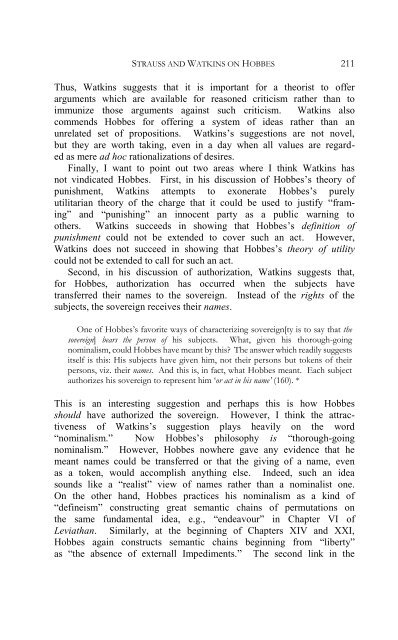Strauss and Watkins on Hobbes' Political Philosophy: A Review
Strauss and Watkins on Hobbes' Political Philosophy: A Review
Strauss and Watkins on Hobbes' Political Philosophy: A Review
Create successful ePaper yourself
Turn your PDF publications into a flip-book with our unique Google optimized e-Paper software.
STRAUSS AND WATKINS ON HOBBES 211<br />
Thus, <str<strong>on</strong>g>Watkins</str<strong>on</strong>g> suggests that it is important for a theorist to offer<br />
arguments which are available for reas<strong>on</strong>ed criticism rather than to<br />
immunize those arguments against such criticism. <str<strong>on</strong>g>Watkins</str<strong>on</strong>g> also<br />
commends Hobbes for offering a system of ideas rather than an<br />
unrelated set of propositi<strong>on</strong>s. <str<strong>on</strong>g>Watkins</str<strong>on</strong>g>’s suggesti<strong>on</strong>s are not novel,<br />
but they are worth taking, even in a day when all values are regard-<br />
ed as mere ad hoc rati<strong>on</strong>alizati<strong>on</strong>s of desires.<br />
Finally, I want to point out two areas where I think <str<strong>on</strong>g>Watkins</str<strong>on</strong>g> has<br />
not vindicated Hobbes. First, in his discussi<strong>on</strong> of Hobbes’s theory of<br />
punishment, <str<strong>on</strong>g>Watkins</str<strong>on</strong>g> attempts to ex<strong>on</strong>erate Hobbes’s purely<br />
utilitarian theory of the charge that it could be used to justify “fram-<br />
ing” <str<strong>on</strong>g>and</str<strong>on</strong>g> “punishing” an innocent party as a public warning to<br />
others. <str<strong>on</strong>g>Watkins</str<strong>on</strong>g> succeeds in showing that Hobbes’s definiti<strong>on</strong> of<br />
punishment could not be extended to cover such an act. However,<br />
<str<strong>on</strong>g>Watkins</str<strong>on</strong>g> does not succeed in showing that Hobbes’s theory of utility<br />
could not be extended to call for such an act.<br />
Sec<strong>on</strong>d, in his discussi<strong>on</strong> of authorizati<strong>on</strong>, <str<strong>on</strong>g>Watkins</str<strong>on</strong>g> suggests that,<br />
for Hobbes, authorizati<strong>on</strong> has occurred when the subjects have<br />
transferred their names to the sovereign. Instead of the rights of the<br />
subjects, the sovereign receives their names.<br />
One of Hobbes’s favorite ways of characterizing sovereign[ty is to say that the<br />
sovereign] bears the pers<strong>on</strong> of his subjects. What, given his thorough-going<br />
nominalism, could Hobbes have meant by this? The answer which readily suggests<br />
itself is this: His subjects have given him, not their pers<strong>on</strong>s but tokens of their<br />
pers<strong>on</strong>s, viz. their names. And this is, in fact, what Hobbes meant. Each subject<br />
authorizes his sovereign to represent him ‘or act in his name’ (160). *<br />
This is an interesting suggesti<strong>on</strong> <str<strong>on</strong>g>and</str<strong>on</strong>g> perhaps this is how Hobbes<br />
should have authorized the sovereign. However, I think the attrac-<br />
tiveness of <str<strong>on</strong>g>Watkins</str<strong>on</strong>g>’s suggesti<strong>on</strong> plays heavily <strong>on</strong> the word<br />
“nominalism.” Now Hobbes’s philosophy is “thorough-going<br />
nominalism.” However, Hobbes nowhere gave any evidence that he<br />
meant names could be transferred or that the giving of a name, even<br />
as a token, would accomplish anything else. Indeed, such an idea<br />
sounds like a “realist” view of names rather than a nominalist <strong>on</strong>e.<br />
On the other h<str<strong>on</strong>g>and</str<strong>on</strong>g>, Hobbes practices his nominalism as a kind of<br />
“defineism” c<strong>on</strong>structing great semantic chains of permutati<strong>on</strong>s <strong>on</strong><br />
the same fundamental idea, e.g., “endeavour” in Chapter VI of<br />
Leviathan. Similarly, at the beginning of Chapters XIV <str<strong>on</strong>g>and</str<strong>on</strong>g> XXI,<br />
Hobbes again c<strong>on</strong>structs semantic chains beginning from “liberty”<br />
as “the absence of externall Impediments.” The sec<strong>on</strong>d link in the
















